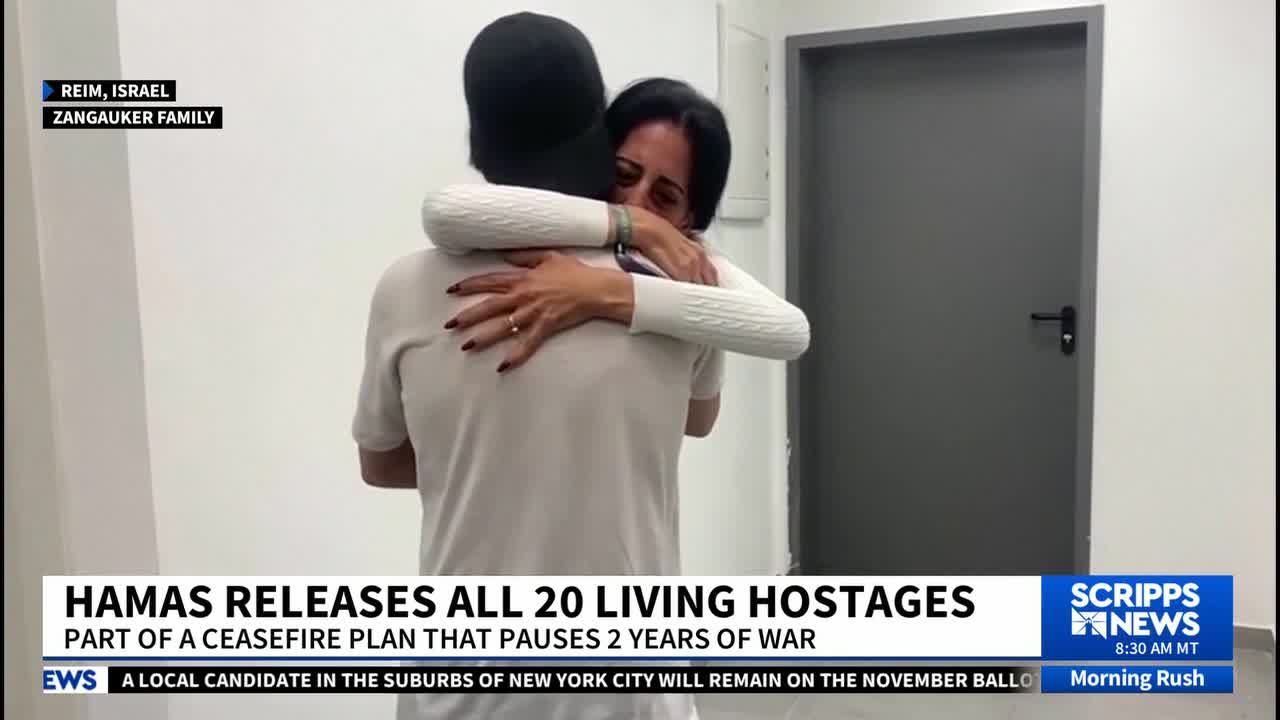People in Israel were rejoicing Monday as loved ones returned home after Hamas released the remaining 20 living hostages from Gaza under a ceasefire agreement brokered by U.S. President Donald Trump
The freed hostages were being reunited with emotional family members after receiving medical evaluations. As part of the deal, Israel also agreed to release nearly 2,000 Palestinian prisoners who returned home and were greeted by cheering crowds.
WATCH | Israeli hostages reunite with family and loved ones
The ceasefire halts two years of war in Gaza that killed tens of thousands of people. It also opens the flow of humanitarian aid into the region. The world's leading authority on food crises has noted that more than half a million people in Gaza face catastrophic levels of hunger, and many more risk dying from malnutrition.
President Trump traveled to Israel on Monday to celebrate the ceasefire agreement. Speaking before the Israeli legislature at the Knesset, he declared an end to the war and called for longstanding peace in the Middle East.
IN CASE YOU MISSED IT | How the Gaza peace plan came together
"It's an incredible triumph for Israel and the world to have all of these nations working together as partners in peace," President Trump said. "And it's pretty unusual for you to see that but it happened in this case. This was a very unusual point in time — a brilliant point in time. Generations from now, this will be remembered as the moment that everything began to change and change very much for the better. Like the U.S.A. right now, it will be the golden age of Israel and the golden age of the Middle East."
The peace deal came together after a flurry of diplomatic activity over the past few weeks that culminated in a breakthrough last week, with Trump announcing phase one of the deal on Truth Social after hinting it was imminent earlier in the day. Phase one of the ceasefire agreement includes the withdrawal of Israeli forces to an agreed upon line, starting a 72 hour period for Hamas to return hostages — both living and dead — that the group has held for more than two years.
That includes the return of 28 dead hostages. However, the Hostages and Missing Families Forum Headquarters said it was "shocked and dismayed" to find out that only four deceased hostages would be returned on Monday.
"This represents a blatant breach of the agreement by Hamas," the group said in a statement obtained by Scripps News. "We expect Israel's government and the mediators to take immediate action to rectify this grave injustice."
Officials said once the release of all hostages occurs, the U.S. will work with the Israelis and U.S. Central Command to set up a joint task force. An official says the U.S. will have 200 people on the ground with a role to oversee and make sure there are no violations, with armed forces from Egypt and Qatar. U.S. troops, another official noted, are not intended to go into Gaza.
IN RELATED NEWS | US is sending about 200 troops to Israel to help support and monitor the Gaza ceasefire deal
The next phase of the ceasefire agreement, according to officials, is determining what comes next in Gaza.
President Trump’s 20-point plan, introduced publicly last month, calls for the decommissioning of Hamas weapons, for Gaza to be governed under a "technocratic apolitical Palestinian committee" — overseen by an international ‘Board of Peace’ chaired by Trump, without a governing role for Hamas and with guarantees from regional partners to ensure Hamas complies with obligations. It also calls for the creation of a temporary International Stabilization Force to deploy in Gaza to help train police and secure borders, which will start building after the hostages are released.
The Trump administration views the deal as a chance for broader peace in the Middle East.
“This is a very delicate time, but I do think there's a real chance the first time, the first time I've seen in the last two years, that you really have a chance to get back to the good momentum that occurred at the end of the President Trump's first administration in the Middle East,” a senior U.S. official said.






